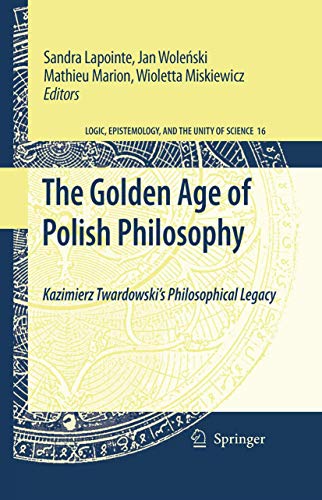The Golden Age of Polish Philosophy: Kazimierz Twardowski's Philosophical Legacy (Logic, Epistemology, and the Unity of Science, 16) - Hardcover

"synopsis" may belong to another edition of this title.
This volume portrays the Polish or Lvov-Warsaw School, one of the most influential schools in analytic philosophy, which, as discussed in the thorough introduction, presented an alternative "working" picture of the unity of science. The school was founded by a phenomenologist, Kazimierz Twardowski, who trained a team of researchers that included some of the most important logicians and philosophers of the history of analytical philosophy, such as Tarski, Lesniewski and Lukasiewicz. The Polish School represented some of the most important trends in philosophy -- aristotelism; the history and philosophy of science; linguistics; the philosophy of logic and mathematics -- and offered an opportunity for all these philosophical disciplines to interact in a natural and fruitful way.
"About this title" may belong to another edition of this title.
- PublisherSpringer
- Publication date2009
- ISBN 10 904812400X
- ISBN 13 9789048124008
- BindingHardcover
- Number of pages264
- EditorLapointe Sandra, Wolenski Jan, Marion Mathieu, Miskiewicz Wioletta
Buy New
Learn more about this copy
Shipping:
FREE
Within U.S.A.
Top Search Results from the AbeBooks Marketplace
The Golden Age of Polish Philosophy: Kazimierz Twardowski's Philosophical Legacy (Logic, Epistemology, and the Unity of Science (16)) [Hardcover ]
Book Description Hardcover. Condition: new. Seller Inventory # 9789048124008
The Golden Age of Polish Philosophy: Kazimierz Twardowski's Philosophical Legacy (Logic, Epistemology, and the Unity of Science, 16)
Book Description Condition: New. Seller Inventory # ABLIING23Apr0316110335135
The Golden Age of Polish Philosophy : Kazimierz Twardowski's Philosophical Legacy
Book Description Condition: New. PRINT ON DEMAND Book; New; Fast Shipping from the UK. No. book. Seller Inventory # ria9789048124008_lsuk
The Golden Age of Polish Philosophy: Kazimierz Twardowski's Philosophical Legacy
Book Description Buch. Condition: Neu. This item is printed on demand - it takes 3-4 days longer - Neuware -Jan Wolenski and Sandra Lapointe Polish philosophy goes back to the 13th century, when Witelo, famous for his works in optics and the metaphysics of light, lived and worked in Silesia. Yet, Poland's academic life only really began after the University of Cracow was founded in 1364 - its development was interrupted by the sudden death of King Kazimierz III, but it was re-established in 1400. The main currents of classical scholastic thought like Thomism, Scottism or Ockhamism had been late - about a century - to come to Poland and they had a considerable impact on the budding Polish philosophical scene. The controversy between the via antiqua and the via moderna was hotly 1 debated. Intellectuals deliberated on the issues of concilliarism (whether the C- mon Council has priority over the Pope) and curialism (whether the Bishop of Rome has priority over the Common Council). On the whole, the situation had at least two remarkable features. Firstly, Polish philosophy was pluralistic, and remained so, since its very beginning. But it was also eclectic, which might explain why it aimed to a large extent at achieving a compromise between rival views. Secondly, given the shortcomings of the political system of the time as well as external pr- sure by an increasingly hegemonic Germany, thinkers were very much interested in political matters. Poland was a stronghold of political thought (mostly inclined towards concilliarism) and Polish political thought distinguished itself in Europe J. 254 pp. Englisch. Seller Inventory # 9789048124008
The Golden Age of Polish Philosophy
Book Description Gebunden. Condition: New. Dieser Artikel ist ein Print on Demand Artikel und wird nach Ihrer Bestellung fuer Sie gedruckt. Designed especially for the Anglo-American market and includes 18 original contributions to one of the most up and coming topics in the field of the History of Analytical philosophy in the Anglo-Saxon worldContains a comprehensive Introduction tha. Seller Inventory # 5817397
The Golden Age of Polish Philosophy : Kazimierz Twardowski's Philosophical Legacy
Book Description Buch. Condition: Neu. Druck auf Anfrage Neuware - Printed after ordering - Jan Wolenski and Sandra Lapointe Polish philosophy goes back to the 13th century, when Witelo, famous for his works in optics and the metaphysics of light, lived and worked in Silesia. Yet, Poland's academic life only really began after the University of Cracow was founded in 1364 - its development was interrupted by the sudden death of King Kazimierz III, but it was re-established in 1400. The main currents of classical scholastic thought like Thomism, Scottism or Ockhamism had been late - about a century - to come to Poland and they had a considerable impact on the budding Polish philosophical scene. The controversy between the via antiqua and the via moderna was hotly 1 debated. Intellectuals deliberated on the issues of concilliarism (whether the C- mon Council has priority over the Pope) and curialism (whether the Bishop of Rome has priority over the Common Council). On the whole, the situation had at least two remarkable features. Firstly, Polish philosophy was pluralistic, and remained so, since its very beginning. But it was also eclectic, which might explain why it aimed to a large extent at achieving a compromise between rival views. Secondly, given the shortcomings of the political system of the time as well as external pr- sure by an increasingly hegemonic Germany, thinkers were very much interested in political matters. Poland was a stronghold of political thought (mostly inclined towards concilliarism) and Polish political thought distinguished itself in Europe J. Seller Inventory # 9789048124008

